
Farley Earle Granger Jr. was an American actor, best known for his two collaborations with director Alfred Hitchcock: Rope in 1948 and Strangers on a Train in 1951.

They Live by Night is a 1948 American film noir directed by Nicholas Ray, in his directorial debut, and starring Cathy O'Donnell and Farley Granger. Based on Edward Anderson's Depression-era novel Thieves Like Us, the film follows a young convict on the run who falls in love with a woman and attempts to begin a life with her.

Cry of the City is a 1948 American film noir starring Victor Mature, Richard Conte, and Shelley Winters. Directed by Robert Siodmak, it is based on the novel by Henry Edward Helseth, The Chair for Martin Rome. The screenwriter Ben Hecht worked on the film's script, but is not credited. The film was partly shot on location in New York City.

Cathy O'Donnell was an American actress, best remembered for her roles in The Best Years of Our Lives,Ben-Hur, and films noir such as Detective Story.
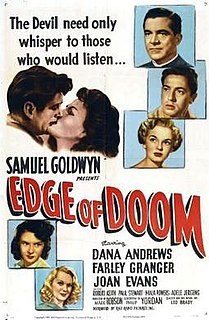
Edge of Doom is a 1950 black-and-white film noir directed by Mark Robson and starring Dana Andrews, Farley Granger, and Joan Evans.

The People Against O'Hara is a 1951 American crime film noir directed by John Sturges and based on Eleazar Lipsky's novel. The film features Spencer Tracy, Pat O'Brien, John Hodiak, and James Arness.
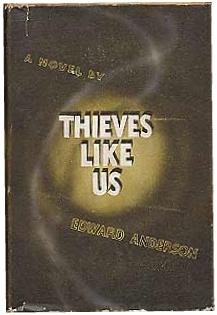
Thieves Like Us is the second and last published novel written by Edward Anderson (1905–1969). It was published in 1937 by Frederick A. Stokes. In a 1974 review of a paperback reissue, The New York Times wrote that "nothing in the book has been diminished by time, including the sentiment of a bank robber named T-Dub Masefeld that bankers are 'thieves just like us.'" See: Crime Novels: American Noir of the 1930s and 40s by Robert Polito (editor), The Library of America (1997).
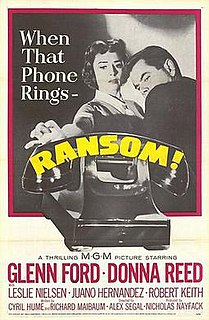
Ransom! is a 1956 American crime drama film examining the reactions of parents, police, and the public to a kidnapping. Written by Richard Maibaum and Cyril Hume, the film is based on a popular episode of The United States Steel Hour titled "Fearful Decision", which aired in 1954 and starred Ralph Bellamy.
I Stole a Million is a 1939 film noir crime film starring George Raft as a cab driver turned small-time crook who makes a big score and lives to regret it. The supporting cast includes Claire Trevor, Dick Foran, and Victor Jory. The movie was written by Nathanael West based on a story idea by Lester Cole, which in turn was based on the life story of bank robber Roy Gardner. It was directed by Frank Tuttle, and released by Universal Pictures.

Stars In My Crown is a 1950 Western film directed by Jacques Tourneur and starring Joel McCrea as a preacher whose faith tames an unruly town by inspiring the townspeople to change. It was based on the 1947 novel of the same name by Joe David Brown.

Eight O'Clock Walk is a 1954 British drama film directed by Lance Comfort and starring Richard Attenborough, Cathy O'Donnell, Derek Farr and Maurice Denham. Its plot involves a taxi driver who is tried for the murder of a young girl on a bomb-site. Based on a true story, Eight O'Clock Walk is an anti-capital punishment film that points out the danger of circumstantial evidence resulting in the death of a mistakenly accused prisoner. It is only by good fortune that the film's innocent protagonist is cleared in this case – and the message is that not everyone might be so lucky.

Murder by Contract is a 1958 American film noir crime film directed by Irving Lerner. Academy Award-nominated screenwriter Ben Maddow did uncredited work on the film. Centering on an existentialist hit man assigned to kill a woman, the film is often praised for its spare style and peculiar sense of cool.

711 Ocean Drive is a 1950 American crime film noir directed by Joseph M. Newman and starring Edmond O'Brien, Joanne Dru and Otto Kruger.

The Naked Street is a 1955 American crime film noir directed by Maxwell Shane. The drama features Farley Granger, Anthony Quinn and Anne Bancroft.
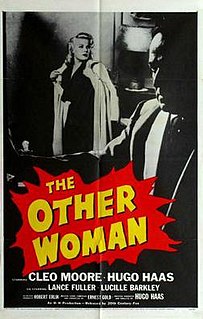
The Other Woman is a 1954 American film noir written, directed and produced by Hugo Haas. Haas, Cleo Moore and John Qualen starred in the film.
Frank Richards was an American character actor, typically portraying a hoodlum or thug with a menacing appearance.
No Questions Asked is a 1951 American crime film noir directed by Harold F. Kress and starring Barry Sullivan, Arlene Dahl, George Murphy and Jean Hagen.
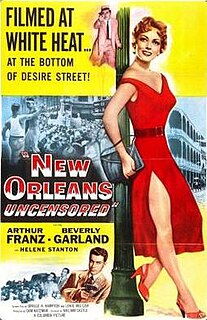
New Orleans Uncensored is a 1955 American film noir crime film directed by William Castle and starring Arthur Franz and Beverly Garland.
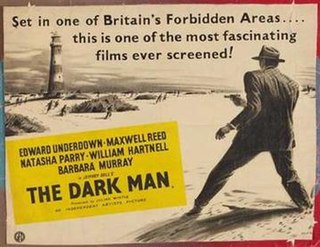
The Dark Man is a 1951 British black and white, film-noir, thriller, crime, drama, film, from Rank Studios, written and directed by Jeffrey Dell, and starring Edward Underdown, Maxwell Reed and Natasha Parry.
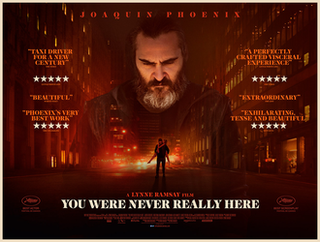
You Were Never Really Here is a 2017 neo-noir psychological thriller film written and directed by Lynne Ramsay. Based on the 2013 novella of the same name by Jonathan Ames, it stars Joaquin Phoenix, Ekaterina Samsonov, Alex Manette, John Doman, and Judith Roberts. In the film, a traumatized mercenary named Joe (Phoenix) is hired by a politician to find and rescue his daughter who has been kidnapped by a human trafficking network, which Joe is instructed to destroy by any violent means. The film was co-produced between the United Kingdom, France and the United States.
















